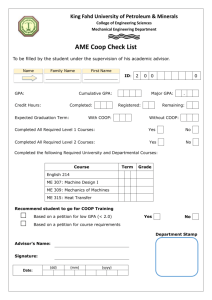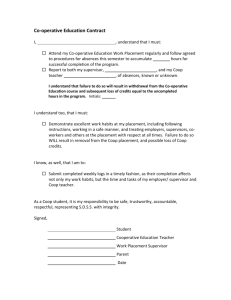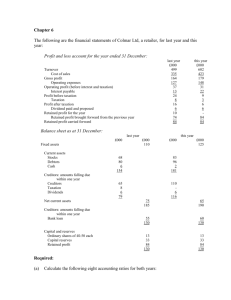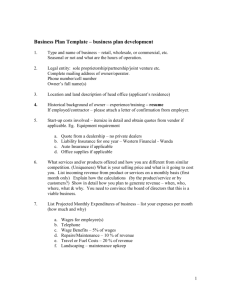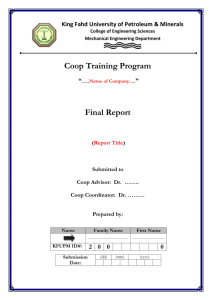Power Point - Food Co
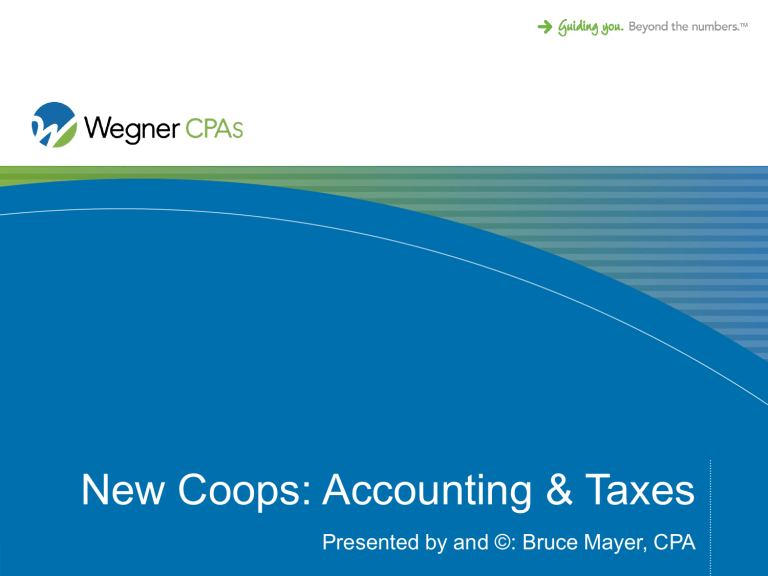
New Coops: Accounting & Taxes
Presented by and ©: Bruce Mayer, CPA
Career Development
• Food coop staff then bookkeeper
• MBA in Accounting
• Public Accounting – CPA
• Work with non-profits
• Coops from coast to coast
FCI Webinar
• Presentation developed specifically for pre-opening food coops
• There are different issues for worker, purchasing, and other kinds of coops
Accountant’s Definition of Coop
• A business owned and democratically controlled by the people who use its services and whose benefits are derived and distributed equitably on the basis of use. (P3)
• Earnings are allocated to members based on the amount of business they do with the cooperative.
Business Characteristics
• A cooperative is not a non-profit or tax exempt organization
– Profits are required to provide reserves and capital for renovation or expansion.
• But may have to incorporate that way and work around it to be a coop
Accounting
• When to start keeping books
– Open bank account is beginning
• Software
– Only for start-up phase
• Excel
• Quicken
– For construction phase and store operation
• QuickBooks
– Online
• MAS 90 - Sage
• MS Dynamics GP
Accounting
• Reporting
– Pre-open – cash, amount of equity & number of owners
– Once the store is open – cash, gross margin, labor
– Cost/Benefit
• Information costs money
• But lack of information leads to poor decisions
Accounting
• Start-up Phase
– What to keep track of:
• Cash in bank at opening of period
• Plus cash deposited
• Less cash spent
• Equals cash in bank at end of period
Accounting
• Start-up Phase
– Categories of deposits
• Income
– Sales
– Donations
– Member fees
• Equity
– Member investments
• Loans
Accounting
• Start-up Phase
– Categories of spending
• Salaries
• Administrative
• Marketing, advertising
• Events
• Repayment of loans or equity
• Transfers between accounts
Accounting
• For construction phase and operations:
– CoopMetrics chart of accounts
• Uniformity, comparability
• Not specifically for GAAP or tax
– Start-up costs are not capitalized
• Legal, consulting
• Marketing
• Labor
– Capitalize only tangible assets
Accounting
• The big difference for a coop: Equity
– Preferred shares
– Member shares
– Retained patronage dividends
– Retained earnings
• Maintain detailed records for each owner
• Spreadsheet for preferred shares
• Database of owner name, address, investment, retained patronage amount
Accounting
• Internal Controls
– Safeguard assets
• Fraud happens!
– Cash disbursements – money out
– Cash receipts – money in
– Bank reconciliations
– Segregation of duties
• Bookkeeper is check on system
– www.grocer.coop/accountingpractices
Taxation
• Payroll
– Use an outside service
• Consequences of errors are high
– Employees vs. contractors
• Based on control
• Project manager is very likely an employee
– Wage & hour rules
– Follow rules for benefits
• Health insurance
• Fringe benefits
– Issue required 1099s for payments for services of
$600 or more
Taxation
• Sales
– Indiana sales tax of 7% plus up to 2% for local taxes
– Groceries exempt
– Register with Department of Revenue when expect taxable sales
– Once open compliance takes work
Taxation
• Property
– All jurisdictions have some form of tax on property
– Need to find who to report to
• Assessor
• Personal property section
Taxation
• Income
– Federal rules –
• File 1120-C – Coop return
• No late penalties if owe no tax
• Basic rate is 15% (up to $50,000 of profit)
– State rules
• Indiana has 8% rate based on federal taxable income
Taxation
• Income – Key Issues
– When to start filing?
• From date of incorporation
• Often delayed until have bank account
• May need to file for back years
– Year-end – does not have to be December
– Federal initial due date 2.5 months after yearend
• Extend an additional 6 months
– Board is responsible for filing
Taxation
• Income – Key Issues
– Donations and grants
• Are taxable income
• Only exception is from a government for property
– Is owner money equity or fee?
• Equity is spelled out in bylaws – not taxable
• Fee is taxable for income tax and probably sales tax
Patronage Dividends
• Compute earnings after year end
• Return earnings to patrons based on business done with the coop
– After holding back reserves as needed
– Paid in cash and equity allocations
• Governed by federal tax law, articles of incorporation, bylaws and state law.
Patronage Dividends
• Recipient of patronage dividend
– Personal use patronage dividend not taxed at all
– Retained portion in members name
• www.cdsconsulting.coop/patronagedividend
Thank You!
Bruce Mayer, MBA, CPA
Partner
Wegner CPAs
608-442-1939
Bruce.Mayer@wegnercpas.com
www.wegnercpas.com


